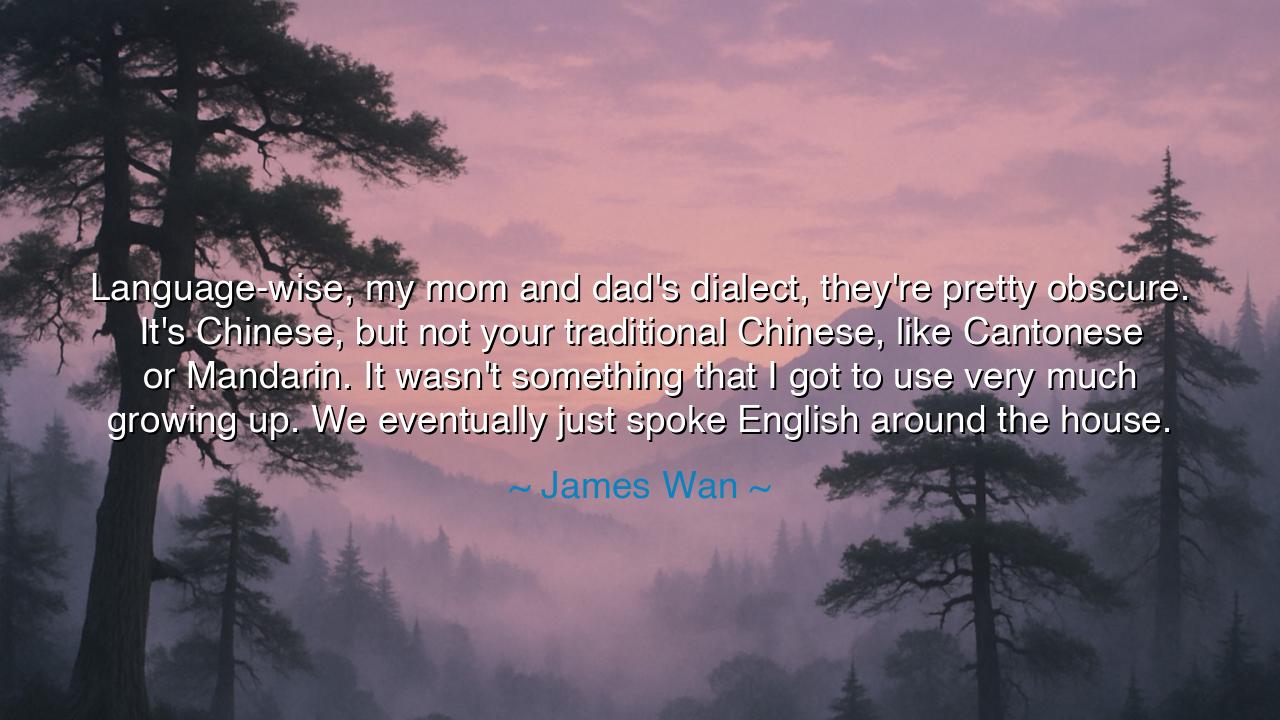
Language-wise, my mom and dad's dialect, they're pretty obscure.
Language-wise, my mom and dad's dialect, they're pretty obscure. It's Chinese, but not your traditional Chinese, like Cantonese or Mandarin. It wasn't something that I got to use very much growing up. We eventually just spoke English around the house.






When James Wan said, “Language-wise, my mom and dad’s dialect, they’re pretty obscure. It’s Chinese, but not your traditional Chinese, like Cantonese or Mandarin. It wasn’t something that I got to use very much growing up. We eventually just spoke English around the house,” he was not merely speaking of language, but of identity, heritage, and the subtle fading of roots across generations. His words are both tender and sorrowful—a quiet recognition of how the voices of our ancestors can grow faint when they are not spoken aloud. Beneath this simple reflection lies a truth as ancient as migration itself: that the price of belonging to a new world is often paid with the slow forgetting of the old.
The origin of these words rests in the story of countless families who have crossed oceans in search of promise. Born in Malaysia to Chinese parents and raised in Australia, Wan lived between worlds—the world of his parents’ dialect, rich and ancient, and the world of English, the language of his future. In his home, the language of his forebears was like a fading song, once vibrant, now seldom sung. His parents’ dialect, a rare branch of the Chinese tongue, carried the memories of their village, their ancestors, their laughter and prayers. Yet as the family adapted to their new life, that dialect found fewer places to rest. It is the story of so many children of immigrants: where the heart remembers, but the tongue forgets.
To those who listen closely, Wan’s reflection carries the weight of loss and transformation. He does not speak with resentment, but with the understanding that language is more than words—it is the soul of a people. A language holds within it a way of seeing, a rhythm of thought, a universe of feeling. When it fades, something sacred is lost—not only for the family, but for the world. And yet, there is also beauty in his words, for he shows that from this blending of cultures, something new is born. The home becomes a meeting place of worlds: the ancient and the modern, the East and the West, the past and the possible. This is not extinction, but evolution—a weaving of heritage into new forms of expression.
History has shown us that this tension between heritage and adaptation is as old as civilization itself. The Roman poet Virgil, in his Aeneid, tells of Aeneas leaving the burning city of Troy to found a new nation in a foreign land. He carries with him the sacred relics of his ancestors, the language of his gods, and the burden of remembrance. Like Aeneas, every migrant carries within them two fires: one that burns for the past, and one that lights the way forward. In Wan’s story, the ancient dialect is the flame of Troy—the ancestral fire carried within, even as new words, new customs, and new dreams take root.
And yet, there is a quiet tragedy here, too. For when children cease to speak the language of their parents, something invisible begins to slip away. The stories of grandparents become harder to tell; the prayers once whispered lose their shape. A dialect is not just speech—it is a vessel of memory. In its syllables lie lullabies, humor, and the wisdom of centuries. When that vessel is no longer passed down, the waters of remembrance grow shallow. But even in this loss, there remains the possibility of reclamation. For though the words may fade from the tongue, they often remain in the heart, waiting for the next generation to rediscover them.
The lesson in Wan’s reflection is clear: remember your roots, even as you grow toward the light of new lands. The languages of our ancestors are not burdens—they are bridges to the souls that came before us. If we cannot speak their words, we can still honor their meaning. We can learn their stories, preserve their customs, and carry their spirit in the way we live. The world does not ask us to remain unchanged; it asks only that we do not forget who we are while we become who we must be.
So, my children of the new age, take heed of this wisdom: learn to speak with two voices—the voice of your past and the voice of your present. Do not let one silence the other. If your family’s tongue is fading, speak it again, even imperfectly. If it has been lost, seek it with reverence. And if you cannot find the words, let your deeds and your gratitude be your language. For heritage is not preserved only through speech, but through remembrance. In honoring both the old and the new, you will find harmony within yourself. And like James Wan, you will carry forward the quiet fire of your ancestors—not as a relic of the past, but as a living flame that lights the future.






AAdministratorAdministrator
Welcome, honored guests. Please leave a comment, we will respond soon